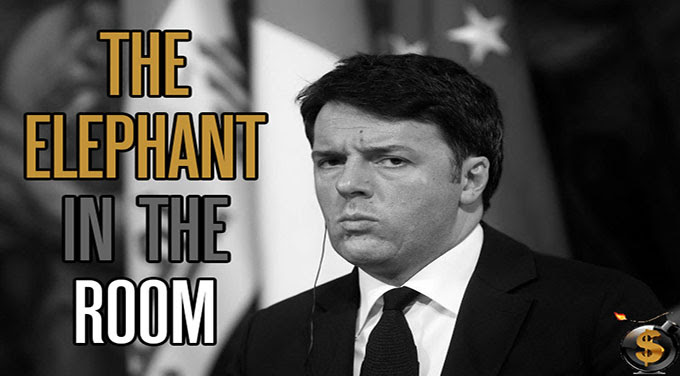By Jeff Berwick.

Not just the euro, but the entire European Union may be in jeopardy next week when the Italians vote on a constitutional referendum initiated by Prime Minister, Matteo Renzi.
What a Jubilee year it has been. First Brexit, then Trump and now it appears Italy is on the cusp of also escaping the grasp of the European Union.
After two years of directly covering trends involved with the disintegration of Western culture in my book Shemitah Trends, I can say with confidence that what has been built up is being torn down. That includes the European Union which will either gradually or abruptly collapse into various pieces.
Nonetheless, the overall centralization and authoritarianism of Europe will not cease. It simply will be ruled in pieces instead of as one region. The disasters that will come as a result of the fracturing, will be used as justifications to create the additional globalism that our controllers seek – though in general, most people are opposed to it.
A splintered Europe is probably easier to control than a homogenous one. Part of control is setting individuals, groups and regions against one another. Having an “enemy” to unite against justifies authoritarianism.
Is Renzi everything he seems to be? His nickname is Il Rottamatore – the “Demolition Man.” It is hard to believe he simply decided the best way to reform Italy was via referendum, especially given the rising anti-euro sentiment and political opposition to constitutional changes.
In order to examine what’s really going on in Italy, you have to be aware of recent political trends — one of the most prominent being George Soros’s affiliation with one of Italy’s most influential political parties, the “Five Star Movement.”
This party was founded by comedian Beppe Grillo and has espoused a variety of anti-mainstream points of view. Most notably, the party has called for a vote on leaving the Eurozone.
It is very possible that if Renzi loses his referendum, political maneuverings could bring further referendums directly affecting Italy’s participation in the EU.
How do we know about Soros’s affiliation with the party? Because he is close friends with economist Joseph Stiglitz who is a good friend of Grillo’s and Stiglitz reportedly has had a strong influence on Grillo’s economic stance.
Papers published in August from DC Leaks reportedly reveal
Soros’s influence directly on emergent political entities including the Five Star party.
Soros-funding has also reportedly expanded Europe’s refugee crisis via the US-based Migration Policy Institute and the Platform for International Cooperation on Undocumented Migrants. Both of these groups have supported the destabilizing resettlement of Muslims in the EU.
Soros made some financial bets on a Brexit win as well, though he made public statements opposing Brexit. He also staked $264 million on Barrick Gold and that company’s share price spiked around 14 percent after Brexit. He also just recently more than doubled his second quarter holdings total in Barrick by increasing his position to 2.85 million shares.
Soros has a furtive hand in Italy’s disintegration from what we can tell – and certainly the destabilization of Europe. Italy is also suffering from an ongoing banking crisis that has impelled critics to label Italy “the mother of all systemic threats.”
For good reason, many economists suspect that the oldest surviving bank in the world, Italy’s Banca Monte dei Paschi di Siena to be near or on the brink of insolvency. According to a stress test conducted back in 2014 by the European Banking Association, Monte dei Paschi was the only bank out of the 130 assessed to receive a failing grade.
The only reason Monte dei Paschi hasn’t already collapsed in the past seven years is because it has been continually bailed out by investors and the government. Now, in addition to the bank only having until the end of the year to dump around 28 billion euros worth of troubled loans, they will also need to raise 5 billion euros in capital in the same time frame.
Perhaps the most striking aspect of the Italian situation is that according to independent estimates, even if Italian banks were “bailed-in” they would still need government intervention (money printing) to keep them afloat. This is a lose-lose situation for the Italian people because not only will many lose their bank savings, but the value of any cash they may have hidden under their mattresses will be destroyed via inflation.
According to the IMF, in total, €360 Billion worth of Italian loans are “bad”. This amounts to around one third of the “bad debt” in the eurozone, which leads many economists to believe any short term improvements in the Italian debt situation will prove to be superficial.
Back in April we reported how the IMF purposely caused a “credit event” in Greece to destabilize Europe. Now the IMF and affiliated agencies are probably in the midst of discussing how to do the same in Italy and elsewhere.
That may sound cynical, but it seems obvious that Europe is being purposefully destabilized.
Renzi’s referendum is one significant example, but the overall financial jeopardy of the Western world is another. The same individuals and groups that have led Europe into its current precarious situation are those in charge of guiding Europe safely through to the other side.
The Italian referendum vote, if Renzi loses, could be the beginning of the end of both the euro and the EU as it is currently constituted.
In fact, as we’ve argued here, we are on the verge of a global economic meltdown and it is difficult to see how it is going to be averted given that the people in charge have a vested interest in advancing the crisis.
Only through disaster can globalization advance. Thus, disaster there will be.


